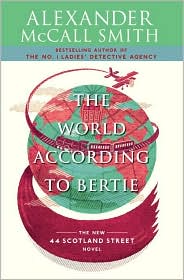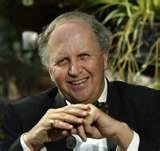“Bertie wanted so much to be the average boy, but he knew that this would forever be beyond his reach. The average boy, he knew, had the average mother, and his mother was not that.”
Alexander McCall Sm ith just can’t lose. Whether it be his nine enormously popular #1 Ladies Detective Agency novels, his three Dr. von Igelfeld Entertainments, the five Sunday Philosophy Club novels, his nineteen children’s books, or his four previous the 44 Scotland Street novels, he succeeds in charming his readers with warm and humorous tales of almost normal life, lived by people who care about each other and the values that make life worth living. Remarkably, he does this without resorting to obvious melodrama or sentimentality.
ith just can’t lose. Whether it be his nine enormously popular #1 Ladies Detective Agency novels, his three Dr. von Igelfeld Entertainments, the five Sunday Philosophy Club novels, his nineteen children’s books, or his four previous the 44 Scotland Street novels, he succeeds in charming his readers with warm and humorous tales of almost normal life, lived by people who care about each other and the values that make life worth living. Remarkably, he does this without resorting to obvious melodrama or sentimentality.
The motley assortment of characters who live at 44 Scotland Street in Edinburgh, familiar to fans of the series, solve one personal problem at a time in each novel, continuing their stories and life issues into the next novel. McCall Smith is so good at creating these characters and capturing the essence of their imperfect lives that readers unfamiliar with the series need not fear that they are missing key background information. The “plot” of each novel (and one uses the term loosely here) is really a series of episodes in the lives of several loosely connected characters, rather than a single complex (and artificial) scheme which ties every character to the same set of problems and complications. Real life is real people living their own lives and dealing with their own problems, and for McCall Smith and his millions of devoted readers, that’s plot enough.
 The fact that little Bertie Pollock, six years old, says he “just wants to be normal,” shows how abnormal his life is, since even he recognizes how different his life is from the lives of other children. Forced to go to advanced music classes, yoga, and psychotherapy once a week, he never gets to be an active, rough-and-tumble boy, and the fact that his mother thinks that little girls, especially the dreaded Olive, are better playmates for him than the boys makes him embarrassed to go to school.
The fact that little Bertie Pollock, six years old, says he “just wants to be normal,” shows how abnormal his life is, since even he recognizes how different his life is from the lives of other children. Forced to go to advanced music classes, yoga, and psychotherapy once a week, he never gets to be an active, rough-and-tumble boy, and the fact that his mother thinks that little girls, especially the dreaded Olive, are better playmates for him than the boys makes him embarrassed to go to school.
Life has not improved for Bertie since the birth of his brother Ulysses. His domineering mother has even enlisted his help when she pumps breast milk for the baby, and the fact that Ulysses seems to resemble Dr. Fairbairn, the psychoanalyst, more than anyone in his own family leads to numerous perplexed questions from Bertie.
In the past Bertie has found some comfort from Cyril, a dog with one gold tooth, who belongs to Angus Lordie, a painter who lives in the building, but Cyril has been “arrested” because he is thought to have bitten someone, and Angus is in the midst of legal proceedings to reclaim him. Other characters at 44 Scotland Street and its neighborhood are also dealing with problems. Matthew, a quiet young man who runs an art gallery, hopes that Pat, who works in his gallery, may become fond of him—and he with her—given enough time. Bruce, a devastatingly handsome narcissist with few financial resources, takes advantage of his female friends, and when he returns, penniless, from London, he moves in with Julia, who is in love with him. Big Lou Brown, who runs the local coffee shop, falls in love with a construction worker who wants to return the Stuarts to the throne, and Antonia, who has previously rented the flat belonging to Dominica, buys her own place in the building and finds a new “love.”
 McCall Smith’s seemingly ordinary characters and their problems “work” because they are just absurd enough to keep the reader interested in their lives while remaining just “normal” enough that the reader can smile in recognition at their folly. Far too gentle to be considered a satirist, McCall Smith nevertheless pokes fun at Edinburgh life—the clubs, intellectual pretensions, and social activities—placing his characters in the context of the city and using irony to give their problems a perspective and humor that keeps the reader involved. He obviously loves these characters, never holding any of them up to ridicule, though the conceited Bruce deserves whatever comeuppance McCall Smith may eventually send his way.
McCall Smith’s seemingly ordinary characters and their problems “work” because they are just absurd enough to keep the reader interested in their lives while remaining just “normal” enough that the reader can smile in recognition at their folly. Far too gentle to be considered a satirist, McCall Smith nevertheless pokes fun at Edinburgh life—the clubs, intellectual pretensions, and social activities—placing his characters in the context of the city and using irony to give their problems a perspective and humor that keeps the reader involved. He obviously loves these characters, never holding any of them up to ridicule, though the conceited Bruce deserves whatever comeuppance McCall Smith may eventually send his way.
Occasionally, he shares wry asides with the reader so subtly they feel like “throwaways.” At one point, Pat, Matthew’s assistant at the art gallery, persuades artist Angus Lordie to offer a blank white canvas as a minimalist painting, giving it a clever name, such as “Anaemic Virgins on their Way to their First Communion in a Snowstorm.” Someone suggests that a prize for minimalism should be given to the best book never written. A guest at the home of an art “connoisseur” suggests that “Perhaps there are minimalist things here already—it’s just that we can’t see them.”
Ultimately, the characters’ domestic problems are resolved—at least for the moment—and the reader is left to reflect on the comfortable “old-shoeness” of McCall Smith’s novels, their gentle good humor and their well-meaning but often clumsy characters, muddling through. As one resident of 44 Scotland Street says, “For the most part, we treat others in a matter-of-fact way; we have to, in order to get on with our lives. But every so often, in a moment of insight that can be very nearly mystical in its intensity, we see others in their real humanity, in a way which makes us want to cherish them as joint pilgrims, almost, on a perilous journey.” McCall Smith’s characters feel like joint pilgrims with his readers.
Notes: Also reviewed here are several other novels by Alexander McCall Smith. Check the Authors tab at the top of the Home page, if you are interested.
The author’s photo appears on http://www.st-andrews.ac.uk/news/archive/2008/Title,26888,en.html
The Bouverie Bed and Breakfast is one of Bertie’s neighbors on Scotland Street. http://www.44scotlandstreet.co.uk/stay.html
Also reviewed here are several other novels by McCall Smith. See Authors tab at top of the Home page, if interested.
